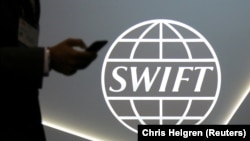On July 2, the Russian state-owned media outlet RT published an article in which an expert claimed the U.S. was using the Society for Worldwide Interbank Financial Telecommunication (SWIFT) as a foreign policy “billy club.”
Polygraph.info reached out to the person cited in the RT article, Mike Maharrey of an organization called the Tenth Amendment Center, to verify if he’d been accurately quoted by RT and for clarification about a Russian "alternative" to SWIFT. While he declined to respond directly, Maharrey wrote a full response on the Tenth Amendment Center website. The response makes a number of claims beyond the scope of this fact check, but also refers to a number of points which will be brought up below.
For example, Maharrey writes: “It may be technically accurate to say the U.S. government does not ‘control’ SWIFT. But the U.S. clearly applies political pressure on the institution and that pressure yields results.”
The Society for Worldwide Interbank Financial Telecommunications or SWIFT was founded in 1973 by 239 banks in 15 different countries. The system provides a standardized, secure and reliable platform for interbank communication, replacing the old manual-input Telex system, which was prone to human error. SWIFT first went into operation in 1977, and the first U.S.-based SWIFT operation center opened in 1979. The organization’s headquarters is in Belgium.
Controversy about the ways SWIFT handled client's personal information erupted in 2006 when it was revealed that SWIFT had been sharing data with U.S. authorities after the September 11 terrorist attacks, allegedly to help track the finances of suspected terror groups. The Washington Post quoted then-Belgium Prime Minister Guy Verhofstadt as saying: “SWIFT finds itself in a conflicting position between American and European law."
In 2009, an interim agreement on data sharing was negotiated between the U.S., SWIFT and some European Union member governments, but the European Parliament blocked it in early 2010, citing insufficient privacy protections. In February 2012, SWIFT responded to U.S. and international pressure and agreed to cut off Iranian banks from the system as part of sanctions against that country. This was the first time SWIFT denied a country access to the system. Access was restored to Iran after it signed onto the Joint Comprehensive Plan of Action regarding its nuclear program. However, after the Trump administration reneged on the Iran nuclear deal, some Iranian banks were again cut off from the system.
The consequences of losing access to SWIFT’s services can be dire: a country that is cut off is unable to pay for imports or receive payment for exports. Therefore, sanctions that curtail access to SWIFT are taken very seriously.
While the U.S. has the ability to pressure SWIFT thanks to its position in the global economy, it could be limited by potential costs that would be felt by U.S. businesses and those of U.S. allies. An Atlantic Council opinion piece warns the U.S. Congress to “be wary of taking unilateral steps to target SWIFT in future legislation,” adding the practice risks hampering the flow of financial data, “slowing global trade and transactions.” Moreover, the U.S. does not directly control SWIFT.
“SWIFT is owned and controlled by its shareholders – you’ll be aware that SWIFT is headquartered and incorporated in Belgium but its international governance and oversight reinforces the neutral, global character of its cooperative structure,” a SWIFT representative told Polygraph.info. “As a critical service provider, SWIFT is also overseen by the G10 central banks (since 1998) and with the National Bank of Belgium (NBB) acting as the lead overseer.”
It should also be noted that in 2014, it was the U.K., not the U.S., which proposed cutting Russia off from SWIFT for Russian military intervention in Ukraine. SWIFT refused to do so.
The RT piece quoted Mike Maharrey as saying Russia has developed its own alternative to SWIFT, which “has become very popular within the country.” The system he referred to is the System for Transfer of Financial Messages, whose development began after 2014. Since then, several hundred Russian companies have begun using the service, although experts say it will have limited appeal outside of Russia and therefore cannot be considered a true alternative to SWIFT.
Similarly, Germany, France, and the United Kingdom have created the “Instrument in Support of Trade Exchanges” (INSTEX), which is intended to allow for the sale of food, medicine, and medical equipment to Iran. Rather than promoting the system as an alternative to SWIFT, however, it has been called a “special purpose vehicle” originally intended to dissuade Iran from continuing its nuclear program in response to the U.S. withdrawal from the agreement.






